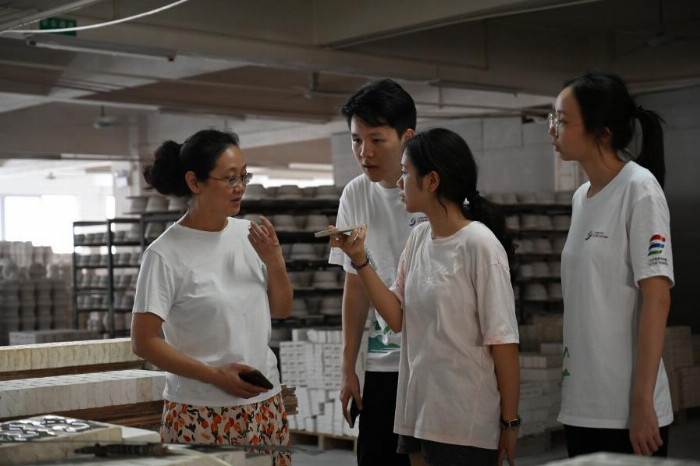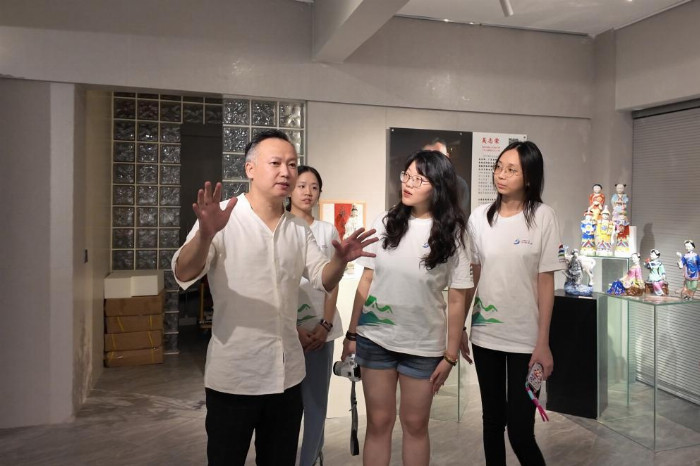
To encourage young students to actively contribute to the development of China's traditional cultural industries, the "Joy in Ceramics" practice team from Guangdong University of Finance and Economics recently conducted a field study in Fengxi Town, Chao'an District, Chaozhou. The team members, all from joint Chinese-foreign academic programs, used their language skills to share the story of Chaozhou ceramics with international friends.
Chaozhou Santai Porcelain Co.,Ltd. is a company in Fengxi Town that primarily exports ceramics, with a complete ceramics production chain. The students toured the company's showroom, where many of the ceramics, infused with foreign cultural elements due to their export nature, piqued the interest of international friends.
Following the tour, the team hosted a live stream from the factory, showcasing the entire ceramics production process with the help of the factory's manager. Unlike typical live streams, they invited international students studying in China, who participated in the event via an online meeting.

The international friends were deeply impressed by the craftsmanship of Chaozhou ceramics and marveled at the rich cultural heritage they represent. They expressed that ceramics are not just objects but also a form of artistic expression and a vessel for cultural transmission. Many of the international students showed strong interest in visiting Chaozhou to experience the traditional charcoal stoves used in the ceramics process.
Chaozhou's ceramics culture is a fusion of history and wisdom. During their research, the team also visited inheritors of various intangible cultural heritage (ICH) practices, including pierced porcelain, ceramic sculpture, and traditional charcoal stoves, gaining firsthand experience of these ancient arts.
One such inheritor, Ye Lihong, who specializes in pierced porcelain, has not only preserved this traditional craft but also innovated upon it. Initially, pierced porcelain involved only carving without the addition of decorative elements, but Ye Lihong has since incorporated Chaozhou cultural themes. She has also been mentoring younger enthusiasts, teaching them techniques such as slip casting, flower modeling, and hollow carving, and encouraging them to find inspiration and innovate, thereby ensuring the continued evolution of this ICH art.
Wu Zhirong, another ICH inheritor focused on ceramic sculpture, is committed to preserving traditional culture while also pushing the boundaries of his craft. His work is gaining recognition beyond China, showcasing the unique appeal of this traditional art form to a global audience.

Chaozhou's charcoal stoves, one of the "Four Treasures of Chaozhou Gongfu Tea," are specialized tools for boiling water and brewing tea. The craft of making these stoves dates back to the Qing Dynasty and involves a meticulous process of dozens of steps.
The students' passion for ceramics is evident in their actions in Chaozhou. According to the faculty advisor of the team, the "Joy in Ceramics" project not only promoted ceramic culture but also deepened international students' understanding of Chinese traditional culture through cross-cultural exchange. The team plans to continue this type of activity, exploring new angles and deeper levels of engagement, to build cultural bridges and open up new possibilities for the global development of Chaozhou ceramics.
高校团队跨文化交流助力潮州陶瓷发展
为引领青年大学生主动投身中华优秀传统文化产业发展,广东财经大学“乐‘瓷’不疲”实践团队近日来到潮州市潮安区枫溪镇进行实地调研。实践团的成员们均来自中外联合培养项目班级,他们以语言为桥梁,向外国友人讲好陶瓷文化故事。
三泰陶瓷厂是枫溪镇一家主要以出口陶瓷为主要业务的企业,拥有一条完整的陶瓷生产产业链。实践团成员们参观了企业的陶瓷展厅,这里的陶瓷由于大量出口的原因,融入了许多外国文化元素,更能提起外国友人的兴趣。
随后,实践团通过新媒体平台在工厂里进行了直播,在负责人的带领下向大众详细介绍了陶瓷的制作流程。与平常直播不同的是,实践团的成员还邀请了在中国留学的外国留学生朋友,以线上会议的形式一同观看直播。
外国友人在直播中被陶瓷的精湛工艺所震撼,对其丰富的文化内涵赞叹不已。他们纷纷表示,陶瓷不仅仅是一种物品,更是一种艺术的表达,一种文化的传承。外国留学生对于来到潮州实地体验炭炉使用表达了强烈的想法。

潮州陶瓷文化是历史和智慧的结晶。实践调研期间,实践团还走访了通花瓷、瓷塑、炭炉等非遗传承人,在他们的带领下体验非遗的神韵。
据介绍,通花瓷非遗传承人叶丽虹不仅传承了传统的通花瓷制作技艺,还在不断地创新发展。从最开始的雕瓷只有镂空没有贴花,到后来将潮州文化呈现,长期以来,叶丽虹寻找喜爱通花瓷的晚辈并培养他们进入研究院学习,教授注浆、捏花、镂空等技艺,再让他们自己寻找灵感和创新题材,让通花瓷非遗技艺从宣扬中来,到创新中去。
瓷塑非遗传承人吴志荣在艺术创作历程中不忘传统文化的传承发扬,也不给自我设限,不断求索创新作品题材、主题、风格等。瓷塑艺术正在逐渐向外走去,让更多人感受到这一传统工艺的独特魅力。
潮州炭炉被誉为“潮州工夫茶”四宝之一,是生火煮水泡茶的专用器具。潮州炭炉制作技艺历史悠久,最早可追溯到清代。据相关传承人介绍,炭炉制作过程要经过几十道工序。
懂瓷乐瓷爱瓷,在潮州,以行动践行信仰。据该团队相关负责老师介绍,本次“乐‘瓷’不疲”的实践之旅,既宣扬了陶瓷文化,同时通过跨文化交流增进了国际学生对中国传统文化的理解。实践团队还计划未来将更加深层次多角度地实践此类活动,搭建起文化沟通的桥梁,为潮州陶瓷文化走向世界发展路径提供更多可能。
文、图丨记者 曾柯权(部分内容由受访者提供)
翻译丨赵凡
英文审校丨林佳岱
-
Video | Diverse, beautiful, and safe: the true Xinjiang as seen by foreign experts and bloggers
2024-09-04 22:33:33 -
Road show organized by the TAT in Guangzhou: 7.3 million Chinese tourists expected in 2024
2024-09-04 22:34:22 -
ThePoint丨What has China brought to Africa since 2000
2024-09-03 23:02:11 -
A repeat win! 'Lingnan on the Cloud' project recognized as a representative case
2024-09-03 23:29:16






